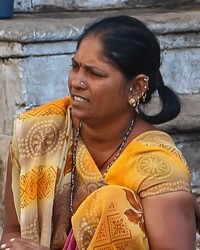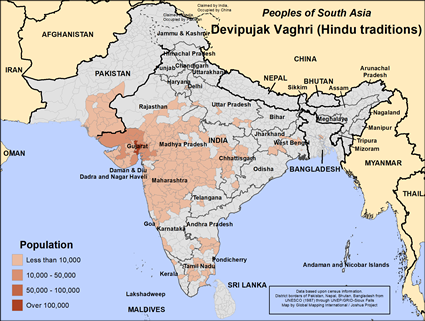Devipujak Vaghri (Hindu traditions) in India

Photo Source:
Bernard Gagnon - Wikimedia
Creative Commons
|

Map Source:
People Group data: Omid. Map geography: UNESCO / GMI. Map Design: Joshua Project.
|
| People Name: | Devipujak Vaghri (Hindu traditions) |
| Country: | India |
| 10/40 Window: | Yes |
| Population: | 566,000 |
| World Population: | 609,000 |
| Primary Language: | Gujarati |
| Primary Religion: | Hinduism |
| Christian Adherents: | 0.12 % |
| Evangelicals: | 0.00 % |
| Scripture: | Complete Bible |
| Ministry Resources: | Yes |
| Jesus Film: | Yes |
| Audio Recordings: | Yes |
| People Cluster: | South Asia Hindu - other |
| Affinity Bloc: | South Asian Peoples |
| Progress Level: |
|
Introduction / History
The Vaghri or Vagri are a Hindu group of people who primarily live in northwest India. Their name Vaghri comes from the Sanskrit word for net. The Vagri were originally forest hunters. During the British colonial period the Vaghri were labeled as a caste of petty thieves. This idea has continued to hurt the Vaghri people in their desire to escape poverty. Besides being hunters, the Vaghri work as traders, hawkers, animal raisers and stonemasons. Most Vaghri are landless. They try to grow vegetables on the small plots of land they possess.
They are classified are a Backward Scheduled Caste so they are eligible for special places in public jobs and university admissions.
The Vaghri speak their language of Vagri among themselves and Gujarati and Hindi to outsiders. The great majority of the Vaghri live in the Indian state of Gujarat. Smaller groups live throughout the nation of India.
What Are Their Lives Like?
The Vaghri are trying to overcome their reputation of being criminals. Since literacy is low and they have limited economic opportunities, some of them have been tempted to live outside the law. They are often denied entrance to Hindu temples and the services of Brahmin priests due to their reputation as criminals.
The Vaghri are endogamous, that is they like to marry within their caste. They do not marry within their individual clans or families. Monogamy is the general rule with families arranging marriages with the consent of the young persons. Newly married couples frequently live near or with the groom's parents. Sons inherit their father's property. Their dead are cremated.
The Vaghri are not vegetarians but as Hindus, they do not eat beef. The main foods are rice, wheat, lentils and seasonal vegetables.
What Are Their Beliefs?
The Vaghri practice Hinduism, the ancient religion of India. They worship and serve the many gods of the Hindu pantheon. The Vaghri often build their own shrines to their patron deities because other Hindus often do not allow them to enter Hindu temples. The Vaghri perform rituals and good works to try to escape the endless cycle of birth and rebirth. At their shrines they present food, flowers and prayers to their gods.
The Vaghri participate in the yearly Hindu holidays of Holi, the festival of colors, Diwali, the festival of lights and Navratri, the celebration of autumn.
What Are Their Needs?
The Vaghri need to hear the message of Jesus Christ that can forgive their sins and bring them new life. The Vaghri need to see the love and mercy of Christ demonstrated to them by Christian workers. They need help in learning new job skills so they can escape their poverty. Christian teachers could help in educating their children so they would have a better chance to succeed in modern Indian society.
Prayer Points
Pray the Holy Spirit will open the hearts of the Vaghri people to desire God's blessings through a movement of family-based discovery Bible studies.
Pray for Indian followers of Jesus to be effective in demonstrating to the Vaghri how Jesus blesses and heals families and communities.
Pray that God's Word might become available in the Vaghri language.